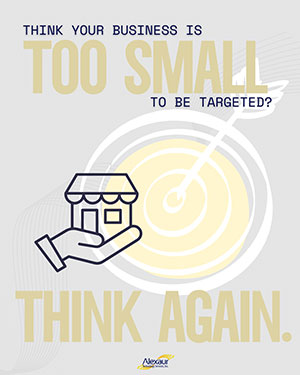 How to Protect Your Company from Holiday Cyber Scams Before It’s Too Late
How to Protect Your Company from Holiday Cyber Scams Before It’s Too Late
It started with what seemed like a simple holiday errand. Last December, an accounts payable clerk at a midsize company received an urgent text from her “CEO”, asking her to buy $3,000 worth of Apple gift cards for client gifts, scratch off the backs, and email the codes.
It sounded odd, but it was the busy holiday season, and the message appeared to come from her boss... By the time she realized something was off, the money was gone.
The loss stung, but it could have been much worse.
Just weeks later, Orion S.A., a chemical manufacturer based in Luxembourg, lost more than $60 million after an employee unknowingly wired multiple payments to cybercriminals posing as trusted partners... The scam was sophisticated, convincing, and devastating, wiping out more than half of the company’s annual profits.
Think your Houston business is too small to catch a cybercriminal’s attention? Think again. During the 2023 holiday season alone, gift card scams cost U.S. businesses more than $217 million, and business email compromise (BEC) attacks made up 73% of all cyber incidents in 2024.
The holidays are prime time for scammers. Employees are stretched thin, distracted, and process more transactions than usual, exactly what attackers look for.
Top 5 Holiday Scams Targeting Houston Businesses
- “Your Boss Needs Gift Cards” -The $3,000 Text Trap
The scam: Criminals impersonate business owners or executives, asking employees to urgently purchase gift cards for “clients” or “employee rewards.”
The prevention: Set a company-wide policy, no gift cards can be purchased without two approvals. Train staff to recognize that leadership will never make such requests over text or personal email.
- Invoice & Payment Switch-Ups, The Big Money Play
The scam: Scammers infiltrate or mimic vendor email threads to send “updated” bank account details right before invoices are paid. In one case, the town of Arlington, Massachusetts, lost nearly $500,000 this way.
The prevention: Always verify banking changes using a known phone number (never the one in the email). For Houston SMBs, implementing a “phone call rule” for all payments over $5,000 can stop fraud cold.
- Fake Shipping & Delivery Notices
The scam: With online orders surging, phishing emails or texts claiming to be from UPS, FedEx, or USPS, are tricking staff into clicking malicious tracking links.
The prevention: Train your team to manually type the carrier’s official website into their browser instead of clicking links in emails or texts.
- Malicious “Holiday Party” Attachments
The scam: Emails with attachments like “Holiday_Schedule.pdf” or “Party_List.xls” secretly install malware once opened.
The prevention: Verify the sender before opening attachments in an email and make sure an advanced endpoint protection is on your computer. If an email looks suspicious, contact your IT Department (or us!) to investigate it before clicking on links or attachments.
- Bogus Holiday Fundraisers
The scam: Fraudsters pose as charities or claim to match company donations, stealing both funds and donor information.
The prevention: Circulate an approved charity list for the season, and ensure all donations go through verified, official channels.
Why These Scams Work and How to Outsmart Them
Today’s cybercriminals use social engineering and research, not random spam, to exploit trust. They mimic tone, timing, and branding so well that even tech-savvy employees can be fooled.
The good news? You can fight back.
- Phishing simulations can reduce risk by 60%.
- Multifactor authentication (MFA) blocks 99% of unauthorized logins.
- Cybersecurity awareness training keeps your employees alert when it matters most.
Your Holiday Cybersecurity Checklist
Before the Houston holiday rush hits full swing, make sure your business is protected:
The Two-Person Rule: Require verbal confirmation from a second team member for any transaction above your set threshold.
Gift Card Policy: No approvals, no purchases, especially via text.
Vendor Verification: Confirm any banking or payment updates through a verified phone call.
MFA Everywhere: Secure all email, banking, and cloud accounts.
Team Briefing: Review these five scams at your next staff meeting, real stories make training stick.
The Hidden Costs of Falling for a Holiday Scam
Losing money is only part of the problem. For small and midsize businesses, the aftermath can be even more painful:
- Interrupted operations during peak season
- Hours (or days) lost to cleanup and recovery
- Damaged customer trust and reputation
- Higher insurance premiums after a breach
The average business email compromise costs $129,000, enough to seriously hurt a growing business right before the year-end.
Keep Your Houston Holidays Merry, Not Messy
The holidays should be a time for celebration, not cyber cleanup. With a few smart policies, employee training, and layered protections, you can ensure cybercriminals don’t ruin your year-end success.
Remember: one verification call could have saved Orion $60 million. A few proactive steps now can save your business from becoming the next headline.
Give your Houston business the best gift this holiday season peace of mind.
Contact us today to schedule a FREE network assessment and learn what holes are in your company’s network and security before the holidays



